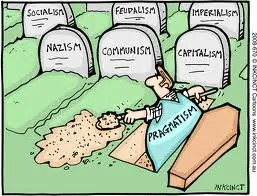Pragmatism is defined in philosophy as the doctrine by which practical consequences are the criteria of knowledge, meaning and value. That is, a proposition is only considered true and good if it works satisfactorily. However, do those “consequences” have to appear on the short term to be considered “practical”? What if what “works” on the short term actually ends up worsening things on the long term? Would it still be pragmatic?
 For example, Marxism offered a very practical, realistic, but long-term proposal based on scientific analyses of historical dynamics and where they were leading us, and what needed to be done here and now to change them. It only started to be called Utopian when proven ineffectual more than seven decades into the experiment. In contrast, it is all too easy to see liberal Western political and economic systems and worldviews as pragmatic and realistic, because their deep flaws have not yet been widely accepted. Nevertheless, they are also breaking up and showing their inability to achieve the vision of the future that inspired them. There is no reason to believe that the time will not come when they, too, will be recognized as having been ideologically-based, ineffectual Utopias.
For example, Marxism offered a very practical, realistic, but long-term proposal based on scientific analyses of historical dynamics and where they were leading us, and what needed to be done here and now to change them. It only started to be called Utopian when proven ineffectual more than seven decades into the experiment. In contrast, it is all too easy to see liberal Western political and economic systems and worldviews as pragmatic and realistic, because their deep flaws have not yet been widely accepted. Nevertheless, they are also breaking up and showing their inability to achieve the vision of the future that inspired them. There is no reason to believe that the time will not come when they, too, will be recognized as having been ideologically-based, ineffectual Utopias.Therefore, if pragmatism means short-sightedness, and Utopianism means working with a long-term vision, then one might be convinced to prefer the latter. The only true question would be what that vision should be and how to go about building it. The centuries-long task of building a new world civilization requires practical action here and now: travelling the visionary path with practical feet. And this is precisely what is asked of agents of change who work towards that new civilization. This is a moral stance, because it requires them to center their lives on something beyond themselves - on the community at large.
Today's brand of authoritarian leadership, which often includes the pain of severe punishments, leads to fear, which leads to hatred, which leads to anger, which leads to thoughts of destroying what caused the pain in the first place. However, this action itself causes more pain, which leads to more fear, hatred, anger, and destruction. Thus, violence engenders violence, in a vicious circle by which the same attitudes are reproduced and reinforced in each generation. Our task as agents of sociocultural change is to break that cycle, first in our own lives, and then to help others to achieve the same.
The easier destructive route is proposed by some as more “pragmatic” than the longer constructive approach. However, the question arises as to whether actions that seek shorter-term results –whatever they may be– can really be considered as necessarily more “pragmatic” than actions that have longer-term results (and that may also require accepting that their fruits will only be seen on the longer term). This has often been the case with acts of violence, killing people and blowing up buildings, which are a good example of why the “pragmatic = short-term” equation does not work. Can we say that the farmer who eats his seeds to satisfy today’s hunger is more “pragmatic” than the farmer who buries that food in the ground with the uncertain hope that someday it will grow and multiply?
Let's go back to leadership for another example. The reason dominant styles of leadership are so popular is precisely because they achieve easy results on the short term. However, their long-term effects are disastrous! Who, then, is more pragmatic? The authoritarian, paternalistic, know-it-all, or manipulative leaders who "get the job done" quickly, even if by doing so they disempower their group members? Or the leaders who patiently empower people so that they will be more effective for the rest of their lives? As Steven Covey says, when working with things you can be efficient, but when dealing with people you can only hope to be effective.

No comments:
Post a Comment